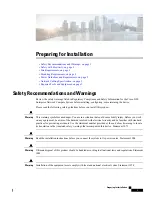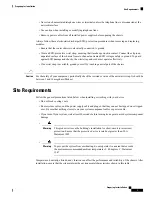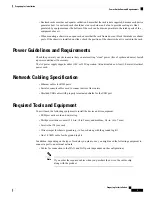
• Enclosed racks must have adequate ventilation. Ensure that the rack is not congested, because each device
generates heat. An enclosed rack should have louvered sides and a fan to provide cooling air. Heat
generated by equipment near the bottom of the rack can be drawn upward into the intake ports of the
equipment above it.
• When mounting a chassis in an open rack, ensure that the rack frame does not block the intake or exhaust
ports. If the chassis is installed on slides, check the position of the chassis when it is seated in the rack.
Power Guidelines and Requirements
Check the power at your site to ensure that you are receiving "clean" power (free of spikes and noise). Install
a power conditioner if necessary.
The AC power supply supports either 110V or 220V operation. All units include a 6-foot (1.8-meter) electrical
power cord.
Network Cabling Specification
• Ethernet cables for RJ45 ports
• Serial or console cables used to connect devices like routers
• Shielded USB cables with properly terminated shields for the USB port
Required Tools and Equipment
You will need the following equipment to install the device and its equipment:
• ESD-preventive cord and wrist strap
• Phillips screwdrivers: small, 3/16-in. (4 to 5 mm), and medium, 1/4-in. (6 to 7 mm)
• Screws that fit your rack
• Wire crimper for chassis grounding - to be used along with the ground lug kit
• One 14 AWG cable for the ground lug kit
In addition, depending on the type of modules you plan to use, you might need the following equipment to
connect a port to an external network
• Cables for connection to the WAN and LAN ports (dependent on the configuration)
If you order the required cables when you purchase the device, the cables ship
along with the product.
Note
Preparing for Installation
5
Preparing for Installation
Power Guidelines and Requirements























